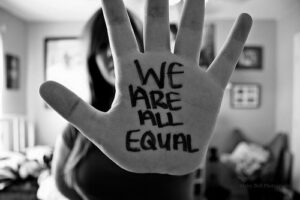IDEALIZING TOXIC LOVE IS HURTING A WHOLE GENERATION.

Love should build, not break. And it is time our generation started distinguishing between chaos and connection and fell in love that really works. /Courtesy
By Whitney Gloria
We are at a weird stage in our relationships nowadays, where red flags are not red flags anymore, but aesthetics. Social media feeds, Tik Tok edits, and even television programs are full of romanticized images of sloppy, disorderly, and emotionally unhealthy relationships, marketed as
passionate love. Rather than being toxicity averse, most youths have been socialized to view it as a sign of true love. Yet to my mind, this is not only a misleading trend, but a very harmful one to a whole generation that struggles to find out what true love is to be like.
The issue starts with the transformation of storytelling. Movies and series liken jealousy to devotion, unending quarrelling to chemistry, and emotional instability to excitement. A possessive partner is seen as “desiring you too much” and controlling is deemed as “protective”.
Even breaking up is romanticized as a status symbol, like to be hurt is a part of being in love. Where dysfunctional relations are romanticized, youths start accepting that love has to be melodramatic to be true.
There are implications of this normalization. Most of them remain in unhealthy relationships due to the fact that they feel that leaving is tantamount to giving up on true love. There are other people who mistake obsession with commitment and believe that it is normal to fight all the
time. Some even take emotional manipulation, believing that any relationships have issues. And though that might be the case, the relationship should not be characterized by problems it must be characterized by growth and respect.
An element of this problem lies in insecurity. This is the era of self-esteem and therefore individuals believe in love they are worth and will accept that love. When players of power model dysfunctional behaviour as cute, it is no big deal to normalize dysfunction as normal.
Author Bell Hooks puts it “Love and abuse cannot coexist.” this implies that the definition of love which she gives as a practice of nurturing our own and another spiritual growth is incompatible with abuse. She counterposes that love is a verb, which has to be committed to,
cared about and brought to bear and not merely a sentiment. Being hurtful or abusive are contrary to love and you cannot show both at the same time. But whole generations are being brought up to believe that suffering goes with the game.
Even Scripture gives a much different image of love. According to the Bible, 1 Corinthians 13: 4-5…, the bible states “Love is patient, love is kind and is not jealous; love does not brag and is not arrogant, does not act unbecomingly; it does not seek its own, is not provoked, does not take into account a wrong suffered …” This verse is the complete opposite of the chaotic, jealousy- driven relationships that the youth is supposed to make a normalcy of. True love is not wild but consistent. Supportive, not suffocating. Healing, not harmful.
When we keep glorifying toxic love, we have a chance of breeding a generation of individuals who will be afraid of healthy relationships because they are boring and pursue unhealthy ones because they are familiar. We are in danger of justifying trauma as passion, pain as loyalty and
instability as intimacy.
Let it be that love is redefined because it should be kind, patient and respectful. Talk openly about limits. Festivate healthy associations. Show the youth that they should never lose their peace, self-worth, and sanity seeking love. Don' t romanticizes bad practices, instead speak up
against them.
Love should build, not break. And it is time our generation started distinguishing between chaos and connection and fell in love that really works.








